 W
W3D tic-tac-toe, also known by the trade name Qubic, is an abstract strategy board game, generally for two players. It is similar in concept to traditional tic-tac-toe but is played in a cubical array of cells, usually 4×4×4. Players take turns placing their markers in blank cells in the array. The first player to achieve four of their own markers in a row wins. The winning row can be horizontal, vertical, or diagonal on a single board as in regular tic-tac-toe, or vertically in a column, or a diagonal line through four boards.
 W
WAggravation is a board game for up to four players and later versions for up to six players, whose object is to be the first player to have all four playing pieces reach the player's home section of the board. The game's name comes from the action of capturing an opponent's piece by landing on its space, which is known as "aggravating".
 W
WBlack Box is an abstract board game for one or two players, which simulates shooting rays into a black box to deduce the locations of "atoms" hidden inside. It was created by Eric Solomon. The board game was published by Waddingtons from the mid-1970s and by Parker Brothers in the late 1970s. The game can also be played with pen and paper, and there are numerous computer implementations for many different platforms, including one which can be run from the Emacs text editor.
 W
WBlockhead! is a game invented in 1952 by G.W. "Jerry" D'Arcey and developed by G.W. and Alice D'Arcey in San Jose, California. Originally consisting of 20 brightly colored wooden blocks of varying shapes, the object of the game is to add blocks to a tower without having it collapse on your turn.
 W
WBoggle is a word game invented by Allan Turoff and originally distributed by Parker Brothers. The game is played using a plastic grid of lettered dice, in which players attempt to find words in sequences of adjacent letters.
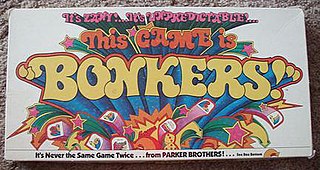 W
WBonkers! is a race-style board game designed by Paul J. Gruen and produced first by Parker Brothers, later by Milton Bradley, and briefly reissued by Winning Moves. The object is to be the first player to score 12 points by adding instruction cards to the empty spaces in an attempt to move to several scoring stations. The game's slogan is "It's Never the Same Game Twice!"
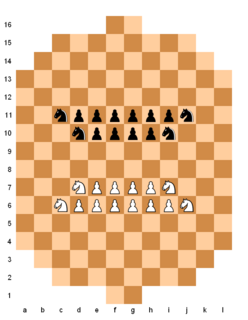 W
WCamelot is a strategy board game for two players. It was invented by George S. Parker late in the 19th century, and was one of the first games published by Parker Brothers, originally under the name Chivalry.
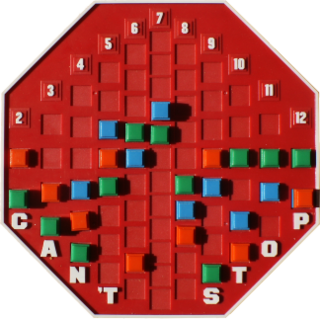 W
WCan't Stop is a board game designed by Sid Sackson originally published by Parker Brothers in 1980; however, that edition has been long out of print in the United States. It was reprinted by Face 2 Face Games in 2007. An iOS version was developed by Playdek and released in 2012. The goal of the game is to "claim" three of the columns before any of the other players can. But the more that the player risks rolling the dice during a turn, the greater the risk of losing the advances made during that turn.
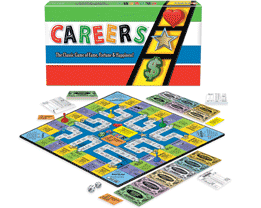 W
WCareers is a board game first manufactured by Parker Brothers in 1955 for $2.97 US, and was most recently produced by Winning Moves Games. It was devised by the sociologist James Cooke Brown. Victory conditions consist of a minimum amount of fame, happiness and money that the player must gain. Players set their own victory conditions before the game begins, the total of which must be sixty.
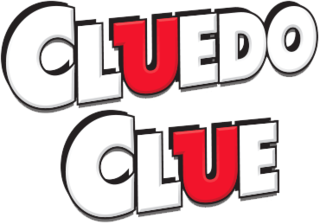 W
WCluedo, known as Clue in North America, is a murder mystery game for three to six players that was devised in 1943 by Anthony E. Pratt from Birmingham, England. The game was first manufactured by Waddingtons in the UK in 1949. Since then, it has been relaunched and updated several times, and it is currently owned and published by the American game and toy company Hasbro.
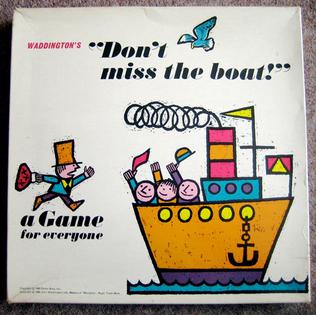 W
WDon't Miss the Boat is a board game for two to four players, with no dice or cards or element of elimination. The rules are simple enough to be mastered by a five-year-old, yet there is no element of chance, and experienced players can use sophisticated tactics and strategies to win. The game was first published by Parker Brothers in 1965, then by Waddingtons in 1966. The title is currently owned by Hasbro and is no longer manufactured.
 W
WEscape from Atlantis is a board game that portrays the sinking of Atlantis and the attempts by the population to escape the sinking island. It was originally released in the United States under the title of Survive! and first published in the English language by Parker Brothers in 1982. The game was invented by Julian Courtland-Smith. Early copies of Escape from Atlantis include the name of the then co-copyright owner, C. Courtland-Smith.
 W
WEscape from Colditz is a strategy card and dice-based board game produced by Gibsons Games of London and first released in 1973. The original game box features escape equipment on the lid and has a four section, black plastic internal game items tray. It was licensed to Parker Brothers in the US in the mid-1970s. The game was co-devised by successful escaper Pat Reid, based on the prisoner-of-war camp at Colditz Castle in Germany during World War II. The castle was built by the King of Poland and Elector of Saxony from 1694 to 1793, Augustus The Strong, upon ruins resulting from the Hussite Wars. The castle's original name was 'Koldyeze', from the Teutonic or Saxon tongue.
 W
WFlinch is a card game that was invented in 1901 by A.J. Patterson. Flinch is a card game that is based on stockpiling. The game is played with a custom deck and was first produced by the Flinch Card Company in Kalamazoo. This custom deck has 150 cards: ten sets of cards numbered from one to fifteen. Some variations use a deck that has 144 cards. Flinch is based on another game called "Spite and Malice". It is currently being published in the USA by Winning Moves Games USA.
 W
WGambler is a board game originally made by Parker Brothers in 1975.
 W
WHex is a two player abstract strategy board game in which players attempt to connect opposite sides of a hexagonal board. Hex was invented by mathematician and poet Piet Hein in 1942 and independently by John Nash in 1948.
 W
WMalarkey is a board game published by Parker Brothers and Hersch and Company of Los Angeles, California starting in 1991.
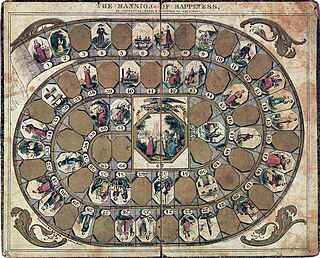 W
WThe Mansion of Happiness: An Instructive Moral and Entertaining Amusement is a children's board game inspired by Christian morality. Players race about a 66-space spiral track depicting virtues and vices with their goal being the Mansion of Happiness at track's end. Instructions upon virtue spaces advance players toward the goal while those upon vice spaces force them to retreat.
 W
WMastermind or Master Mind is a code-breaking game for two players. The modern game with pegs was invented in 1970 by Mordecai Meirowitz, an Israeli postmaster and telecommunications expert. It resembles an earlier pencil and paper game called Bulls and Cows that may date back a century.
 W
WMerlin is a handheld electronic game first made by Parker Brothers in 1978.
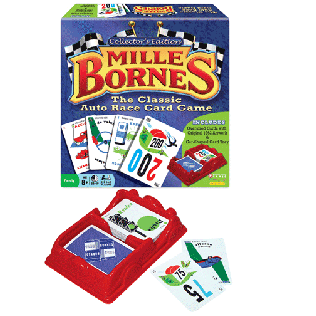 W
WMille Bornes is a French designer card game. Mille Bornes is listed in the GAMES Magazine Hall of Fame.
 W
WThe ouija, also known as a spirit board or talking board, is a flat board marked with the letters of the alphabet, the numbers 0–9, the words "yes", "no", occasionally "hello" and "goodbye", along with various symbols and graphics. It uses a planchette as a movable indicator to spell out messages during a séance. Participants place their fingers on the planchette, and it is moved about the board to spell out words. "Ouija" is a trademark of Hasbro, but is often used generically to refer to any talking board.
 W
WParcheesi is a brand-name American adaptation of the Indian cross and circle board game Pachisi, published by Parker Brothers and Winning Moves Games USA.
 W
WPay Day is a board game originally made by Parker Brothers in 1975. It was invented by Paul J. Gruen of West Newbury, Massachusetts, United States, one of the era's top board game designers, and his brother-in-law Charles C. Bailey. It was Gruen's most successful game, outselling Monopoly in its first production year. Pay Day is currently marketed by Winning Moves Games USA.
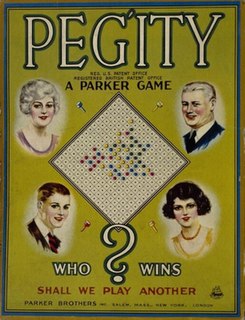 W
WPegity is a strategic board game originally published by Parker Brothers in 1925 that is similar to Gomoku.
 W
WPit is a fast-paced card game for three to eight players, designed to simulate open outcry bidding for commodities. The game first went on sale in 1904 by the American games company Parker Brothers, having been developed by the clairvoyant Edgar Cayce.
 W
WProbe is a parlor game or board game introduced in the 1960s by Parker Brothers. It is reminiscent of the simple two-person game Hangman, whose object is to guess a word chosen by another player by revealing specific letters. Probe extends the number of players to a maximum of four and introduces additional game elements that increase the levels of both skill and chance. Like Hangman, each player has a secret chosen word. But unlike Hangman, the game ends when the last word, not the first word, is revealed. All players remain in the game until the end. It was created by Ted Leavitt and licensed by him to Parker Brothers.
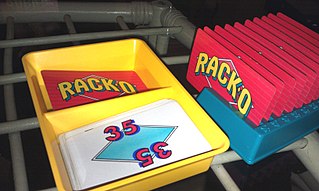 W
WRack-O is a Milton Bradley sequential-matching card game with the objective of obtaining 10 numbers, in numerical order, in one's hand. Score may be kept on a separate piece of paper, based upon either a custom system or the system provided in the rule book. Rack-O allows between 2-4 players, and is recommended for players age 8 and up. Rack-O was released in 1956 and is currently being produced by Winning Moves Games USA.
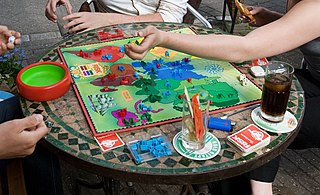 W
WRisk is a strategy board game of diplomacy, conflict and conquest for two to six players. The standard version is played on a board depicting a political map of the world, divided into forty-two territories, which are grouped into six continents. Turns rotate among players who control armies of playing pieces with which they attempt to capture territories from other players, with results determined by dice rolls. Players may form and dissolve alliances during the course of the game. The goal of the game is to occupy every territory on the board and, in doing so, eliminate the other players. The game can be lengthy, requiring several hours to multiple days to finish. European versions are structured so that each player has a limited "secret mission" objective that shortens the game.
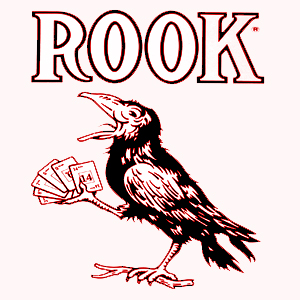 W
WRook is a trick-taking game, usually played with a specialized deck of cards. Sometimes referred to as Christian cards or missionary cards, Rook playing cards were introduced by Parker Brothers in 1906 to provide an alternative to standard playing cards for those in the Puritan tradition, and those in Mennonite culture who considered the face cards in a regular deck inappropriate because of their association with gambling and cartomancy.
 W
WSorry! is a board game that is based on the ancient Indian cross and circle game Pachisi. Players move their three or four pieces around the board, attempting to get all of their pieces "home" before any other player. Originally manufactured by W.H. Storey & Co in England and now by Hasbro, Sorry! is marketed for two to four players, ages 6 and up. The game title comes from the many ways in which a player can negate the progress of another, while issuing an apologetic "Sorry!"
 W
WStar Wars: The Interactive Video Board Game: Assault on the Death Star is a board game and accompanying VHS video tape, released by Parker Brothers in 1996. It is notable for including new scenes shot twenty years after the first Star Wars film, featuring Darth Vader walking down the halls of the original Death Star set, in a performance reprised by David Prowse, James Earl Jones, and director of photography Gilbert Taylor. The game led to the canonization of four new characters in the Star Wars universe.
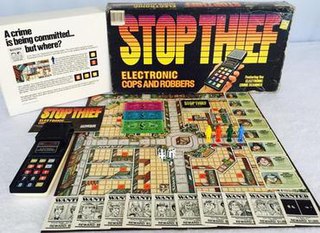 W
WStop Thief is an American-originated electronic board game published by Parker Brothers. It was released in 1979. In 2016, Restoration Games announced that they were bringing back a restored version of the game, using a free smartphone companion app in place of the electronic device. On April 11, 2017, they successfully funded a Kickstarter campaign for the game.
 W
WTouring is a specialty card game originally designed by William Janson Roche and patented by the Wallie Dorr Company and produced in 1906. It was acquired by Parker Brothers in 1925.
 W
WTrivial Pursuit is a board game from Canada in which winning is determined by a player's ability to answer general knowledge and popular culture questions. Players move their pieces around a board, the squares they land on determining the subject of a question they are asked from a card. Each correct answer allows the player's turn to continue; a correct answer on one of the six "category headquarters" spaces earns a plastic wedge which is slotted into the answerer's playing piece. The object of the game is to collect all six wedges from each "category headquarters" space, and then return to the center "hub" space to answer a question in a category selected by the other players.
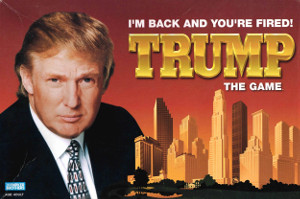 W
WTrump: The Game is a board game named after American businessman Donald Trump. Milton Bradley Company initially released the game in 1989, but it sold poorly, with only 800,000 copies sold out of an expected two million. Parker Brothers re-released Trump: The Game in 2004 following the success of Trump's reality television series, The Apprentice, from earlier that year.
 W
WWide World is a board game published by Parker Brothers, a subsidiary of Hasbro. The players are dealt a number of Destination cards. When a destination is visited then the player takes two Product cards, which are either worth 1 or 2 points. The player who visits all his destinations first then returns home is awarded an extra 5 points, and the player with the most points wins.